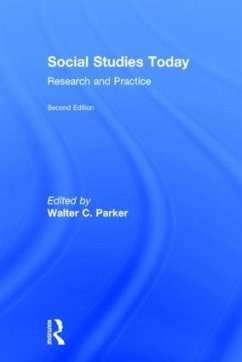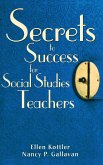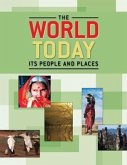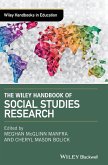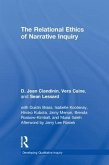Social Studies Today
Research and Practice
Herausgeber: Parker, Walter C
Social Studies Today
Research and Practice
Herausgeber: Parker, Walter C
- Gebundenes Buch
- Merkliste
- Auf die Merkliste
- Bewerten Bewerten
- Teilen
- Produkt teilen
- Produkterinnerung
- Produkterinnerung
Social Studies Today will help educators-teachers, curriculum specialists, and researchers-think deeply about contemporary social studies education.
Andere Kunden interessierten sich auch für
![Secrets to Success for Social Studies Teachers Secrets to Success for Social Studies Teachers]() Ellen KottlerSecrets to Success for Social Studies Teachers78,99 €
Ellen KottlerSecrets to Success for Social Studies Teachers78,99 €![The World Today The World Today]() Linda ConnorThe World Today55,99 €
Linda ConnorThe World Today55,99 €![The Afrocentric PRAXIS of Teaching for Freedom The Afrocentric PRAXIS of Teaching for Freedom]() Joyce E KingThe Afrocentric PRAXIS of Teaching for Freedom180,99 €
Joyce E KingThe Afrocentric PRAXIS of Teaching for Freedom180,99 €![American Education American Education]() Joel SpringAmerican Education170,99 €
Joel SpringAmerican Education170,99 €![The Wiley Handbook of Social Studies Research The Wiley Handbook of Social Studies Research]() The Wiley Handbook of Social Studies Research213,99 €
The Wiley Handbook of Social Studies Research213,99 €![The Relational Ethics of Narrative Inquiry The Relational Ethics of Narrative Inquiry]() D Jean ClandininThe Relational Ethics of Narrative Inquiry181,99 €
D Jean ClandininThe Relational Ethics of Narrative Inquiry181,99 €![Rigor in the 6-12 Ela and Social Studies Classroom Rigor in the 6-12 Ela and Social Studies Classroom]() Barbara R BlackburnRigor in the 6-12 Ela and Social Studies Classroom115,99 €
Barbara R BlackburnRigor in the 6-12 Ela and Social Studies Classroom115,99 €-
-
-
Social Studies Today will help educators-teachers, curriculum specialists, and researchers-think deeply about contemporary social studies education.
Hinweis: Dieser Artikel kann nur an eine deutsche Lieferadresse ausgeliefert werden.
Hinweis: Dieser Artikel kann nur an eine deutsche Lieferadresse ausgeliefert werden.
Produktdetails
- Produktdetails
- Verlag: Taylor & Francis
- 2nd edition
- Seitenzahl: 310
- Erscheinungstermin: 10. April 2015
- Englisch
- Abmessung: 231mm x 152mm x 23mm
- Gewicht: 590g
- ISBN-13: 9781138846814
- ISBN-10: 1138846813
- Artikelnr.: 41608725
- Herstellerkennzeichnung
- Libri GmbH
- Europaallee 1
- 36244 Bad Hersfeld
- gpsr@libri.de
- Verlag: Taylor & Francis
- 2nd edition
- Seitenzahl: 310
- Erscheinungstermin: 10. April 2015
- Englisch
- Abmessung: 231mm x 152mm x 23mm
- Gewicht: 590g
- ISBN-13: 9781138846814
- ISBN-10: 1138846813
- Artikelnr.: 41608725
- Herstellerkennzeichnung
- Libri GmbH
- Europaallee 1
- 36244 Bad Hersfeld
- gpsr@libri.de
Walter C. Parker is Professor and Chair of Social Studies Education and (by courtesy) Professor of Political Science at the University of Washington, Seattle.
Preface. Introduction. 1. Social studies education eC21. Walter C. Parker.
Purpose Matters. 2. Social studies and the social order: transmission or
transformation? William B. Stanley. 3. The social studies wars, now and
then. Ronald W. Evans. 4. Why don't more history teachers engage students
in interpretation? Keith Barton & Linda Levstik. 5. High-stakes testing:
How are social studies teachers responding? S. G. Grant. 6. Authentic
intellectual work: common standards for teaching social studies. M. Bruce
King, Fred M. Newmann & Dana L. Carmichael. 7. Achieving authentic
pedagogy: Plan units not lessons. John Saye & Associates. 8. The
unfortunate consequences of bloom's taxonomy. Roland Case. Perspective
Matters. 9. Education and diversity. James A. Banks, Peter Cookson, Geneva
Gay, Willis D. Hawley, Jacqueline Jordan Irvine, Sonia Nieto, Janet Ward
Schofield, & Walter Stephan. 10. Isn't culturally responsive instruction
just good teaching? Kathryn H. Au. 11. Silence on gays and lesbians in
social studies curriculum. Stephen J. Thornton. 12. Race, gender, and the
teaching and learning of national history. Terrie Epstein & Jessica
Shiller. 13. Should social studies be patriotic? Joel Westheimer. 14.
Building the civic potential of immigrant youth. Kathryn M. Obenchain &
Rebecca M. Callahan. Subject Matters. 15. What can Forrest Gump tell us
about students' historical understanding? Sam Wineburg, Susan Mosborg, &
Dan Porat. 16. What does it mean to think historically ... and how do you
teach it? Bruce Van Sledright. 17. What makes a good history essay:
Assessing historical aspects of argumentative writing. Chauncey Monte-Sano.
18. What do children know about cultural universals? Jere Brophy & Janet
Alleman. 19. "Holocaust fatigue" in teaching today. Simone Schweber. 20.
High quality civic education: What is it and who gets it? Joseph Kahne &
Ellen Middaugh. 21. Action civics in the classroom. Meira Levinson. 22.
Youth civic identity development in the U.S. History course. Beth C. Rubin.
Global Matters. 23. Using literature to teach about Others: The case of
Shabanu. Margaret Smith Crocco. 24. The two world histories. Ross E Dunn.
25. Around the world with geospatial technologies. Andrew J. Milson &
Joseph J. Kerski. 26. Keeping, making, and building peace in school. Kathy
Bickmore. 27. Judging the credibility of Internet sources: developing
critical and reflexive readers on complex digital texts. Mark Baildon &
James Damico. Puzzles. 28. Discussion in social studies: Is it worth the
trouble? Diana Hess. 29. What constrains meaningful social studies
teaching? Catherine Cornbleth. 30. Can tolerance be taught? Patricia G.
Avery. 31. Teaching intellectually challenging social studies in the middle
school: problems and possibilities. Hilary G. Conklin. 32. Teaching With
and About Film. Jeremy Stoddard. Credits. Index.
Purpose Matters. 2. Social studies and the social order: transmission or
transformation? William B. Stanley. 3. The social studies wars, now and
then. Ronald W. Evans. 4. Why don't more history teachers engage students
in interpretation? Keith Barton & Linda Levstik. 5. High-stakes testing:
How are social studies teachers responding? S. G. Grant. 6. Authentic
intellectual work: common standards for teaching social studies. M. Bruce
King, Fred M. Newmann & Dana L. Carmichael. 7. Achieving authentic
pedagogy: Plan units not lessons. John Saye & Associates. 8. The
unfortunate consequences of bloom's taxonomy. Roland Case. Perspective
Matters. 9. Education and diversity. James A. Banks, Peter Cookson, Geneva
Gay, Willis D. Hawley, Jacqueline Jordan Irvine, Sonia Nieto, Janet Ward
Schofield, & Walter Stephan. 10. Isn't culturally responsive instruction
just good teaching? Kathryn H. Au. 11. Silence on gays and lesbians in
social studies curriculum. Stephen J. Thornton. 12. Race, gender, and the
teaching and learning of national history. Terrie Epstein & Jessica
Shiller. 13. Should social studies be patriotic? Joel Westheimer. 14.
Building the civic potential of immigrant youth. Kathryn M. Obenchain &
Rebecca M. Callahan. Subject Matters. 15. What can Forrest Gump tell us
about students' historical understanding? Sam Wineburg, Susan Mosborg, &
Dan Porat. 16. What does it mean to think historically ... and how do you
teach it? Bruce Van Sledright. 17. What makes a good history essay:
Assessing historical aspects of argumentative writing. Chauncey Monte-Sano.
18. What do children know about cultural universals? Jere Brophy & Janet
Alleman. 19. "Holocaust fatigue" in teaching today. Simone Schweber. 20.
High quality civic education: What is it and who gets it? Joseph Kahne &
Ellen Middaugh. 21. Action civics in the classroom. Meira Levinson. 22.
Youth civic identity development in the U.S. History course. Beth C. Rubin.
Global Matters. 23. Using literature to teach about Others: The case of
Shabanu. Margaret Smith Crocco. 24. The two world histories. Ross E Dunn.
25. Around the world with geospatial technologies. Andrew J. Milson &
Joseph J. Kerski. 26. Keeping, making, and building peace in school. Kathy
Bickmore. 27. Judging the credibility of Internet sources: developing
critical and reflexive readers on complex digital texts. Mark Baildon &
James Damico. Puzzles. 28. Discussion in social studies: Is it worth the
trouble? Diana Hess. 29. What constrains meaningful social studies
teaching? Catherine Cornbleth. 30. Can tolerance be taught? Patricia G.
Avery. 31. Teaching intellectually challenging social studies in the middle
school: problems and possibilities. Hilary G. Conklin. 32. Teaching With
and About Film. Jeremy Stoddard. Credits. Index.
Preface. Introduction. 1. Social studies education eC21. Walter C. Parker.
Purpose Matters. 2. Social studies and the social order: transmission or
transformation? William B. Stanley. 3. The social studies wars, now and
then. Ronald W. Evans. 4. Why don't more history teachers engage students
in interpretation? Keith Barton & Linda Levstik. 5. High-stakes testing:
How are social studies teachers responding? S. G. Grant. 6. Authentic
intellectual work: common standards for teaching social studies. M. Bruce
King, Fred M. Newmann & Dana L. Carmichael. 7. Achieving authentic
pedagogy: Plan units not lessons. John Saye & Associates. 8. The
unfortunate consequences of bloom's taxonomy. Roland Case. Perspective
Matters. 9. Education and diversity. James A. Banks, Peter Cookson, Geneva
Gay, Willis D. Hawley, Jacqueline Jordan Irvine, Sonia Nieto, Janet Ward
Schofield, & Walter Stephan. 10. Isn't culturally responsive instruction
just good teaching? Kathryn H. Au. 11. Silence on gays and lesbians in
social studies curriculum. Stephen J. Thornton. 12. Race, gender, and the
teaching and learning of national history. Terrie Epstein & Jessica
Shiller. 13. Should social studies be patriotic? Joel Westheimer. 14.
Building the civic potential of immigrant youth. Kathryn M. Obenchain &
Rebecca M. Callahan. Subject Matters. 15. What can Forrest Gump tell us
about students' historical understanding? Sam Wineburg, Susan Mosborg, &
Dan Porat. 16. What does it mean to think historically ... and how do you
teach it? Bruce Van Sledright. 17. What makes a good history essay:
Assessing historical aspects of argumentative writing. Chauncey Monte-Sano.
18. What do children know about cultural universals? Jere Brophy & Janet
Alleman. 19. "Holocaust fatigue" in teaching today. Simone Schweber. 20.
High quality civic education: What is it and who gets it? Joseph Kahne &
Ellen Middaugh. 21. Action civics in the classroom. Meira Levinson. 22.
Youth civic identity development in the U.S. History course. Beth C. Rubin.
Global Matters. 23. Using literature to teach about Others: The case of
Shabanu. Margaret Smith Crocco. 24. The two world histories. Ross E Dunn.
25. Around the world with geospatial technologies. Andrew J. Milson &
Joseph J. Kerski. 26. Keeping, making, and building peace in school. Kathy
Bickmore. 27. Judging the credibility of Internet sources: developing
critical and reflexive readers on complex digital texts. Mark Baildon &
James Damico. Puzzles. 28. Discussion in social studies: Is it worth the
trouble? Diana Hess. 29. What constrains meaningful social studies
teaching? Catherine Cornbleth. 30. Can tolerance be taught? Patricia G.
Avery. 31. Teaching intellectually challenging social studies in the middle
school: problems and possibilities. Hilary G. Conklin. 32. Teaching With
and About Film. Jeremy Stoddard. Credits. Index.
Purpose Matters. 2. Social studies and the social order: transmission or
transformation? William B. Stanley. 3. The social studies wars, now and
then. Ronald W. Evans. 4. Why don't more history teachers engage students
in interpretation? Keith Barton & Linda Levstik. 5. High-stakes testing:
How are social studies teachers responding? S. G. Grant. 6. Authentic
intellectual work: common standards for teaching social studies. M. Bruce
King, Fred M. Newmann & Dana L. Carmichael. 7. Achieving authentic
pedagogy: Plan units not lessons. John Saye & Associates. 8. The
unfortunate consequences of bloom's taxonomy. Roland Case. Perspective
Matters. 9. Education and diversity. James A. Banks, Peter Cookson, Geneva
Gay, Willis D. Hawley, Jacqueline Jordan Irvine, Sonia Nieto, Janet Ward
Schofield, & Walter Stephan. 10. Isn't culturally responsive instruction
just good teaching? Kathryn H. Au. 11. Silence on gays and lesbians in
social studies curriculum. Stephen J. Thornton. 12. Race, gender, and the
teaching and learning of national history. Terrie Epstein & Jessica
Shiller. 13. Should social studies be patriotic? Joel Westheimer. 14.
Building the civic potential of immigrant youth. Kathryn M. Obenchain &
Rebecca M. Callahan. Subject Matters. 15. What can Forrest Gump tell us
about students' historical understanding? Sam Wineburg, Susan Mosborg, &
Dan Porat. 16. What does it mean to think historically ... and how do you
teach it? Bruce Van Sledright. 17. What makes a good history essay:
Assessing historical aspects of argumentative writing. Chauncey Monte-Sano.
18. What do children know about cultural universals? Jere Brophy & Janet
Alleman. 19. "Holocaust fatigue" in teaching today. Simone Schweber. 20.
High quality civic education: What is it and who gets it? Joseph Kahne &
Ellen Middaugh. 21. Action civics in the classroom. Meira Levinson. 22.
Youth civic identity development in the U.S. History course. Beth C. Rubin.
Global Matters. 23. Using literature to teach about Others: The case of
Shabanu. Margaret Smith Crocco. 24. The two world histories. Ross E Dunn.
25. Around the world with geospatial technologies. Andrew J. Milson &
Joseph J. Kerski. 26. Keeping, making, and building peace in school. Kathy
Bickmore. 27. Judging the credibility of Internet sources: developing
critical and reflexive readers on complex digital texts. Mark Baildon &
James Damico. Puzzles. 28. Discussion in social studies: Is it worth the
trouble? Diana Hess. 29. What constrains meaningful social studies
teaching? Catherine Cornbleth. 30. Can tolerance be taught? Patricia G.
Avery. 31. Teaching intellectually challenging social studies in the middle
school: problems and possibilities. Hilary G. Conklin. 32. Teaching With
and About Film. Jeremy Stoddard. Credits. Index.

